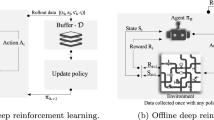Abstract
Modern pipeline energy systems are structurally complex and geographically distributed engineering installations with hundreds of thousands of interconnected process facilities. The optimal control of such systems is a highly responsible task that cannot be solved without applied decision support software and automated control systems. This article addresses the promising area for the development of intelligent systems of the pipeline energy infrastructure control based on deep reinforcement learning technologies. The authors suggested approaches to the learning of digital models and proved them using the examples of operating gas industry systems. Also, they considered the peculiarities of introducing new technologies and outlined further research prospects.
Access this chapter
Tax calculation will be finalised at checkout
Purchases are for personal use only
Similar content being viewed by others
References
Mnih, V., Kavukcuoglu, K., Silver, D., Rusu, A.A., Veness, J., Bellemare, M.G., Graves, A., Riedmiller, M., Fidjeland, A.K., Ostrovski, G.: Human-level control through deep reinforcement learning. Nature 518(7540), 529 (2015)
Sardanashvili, S.A.: Raschetnye metody i algoritmy: gazotransportnye sistemy [Computational methods and algorithms: gas pipeline transport]. Gubkin Russian State University of Oil and Gas, Moscow (2005)
Silver, D., Huang, A., Maddison, C.J., Guez, A., Sifre, L., Van Den Driessche, G., Schrittwieser, J., Antonoglou, I., Panneershelvam, V., Lanctot, M.: Mastering the game of Go with deep neural networks and tree search. Nature 529(7587), 484 (2016)
Sukharev, M.G., Karasevich, A.M.: Tehnologicheskij raschjot i obespechenie nadjozhnosti gazo- i nefteprovodov [Technological calculation and provision of reliability of gas and oil pipelines]. Gubkin Russian State University of Oil and Gas, Moscow (2000)
Sutton, R.S., Barto, A.G.: Reinforcement Learning: An Introduction. MIT Press, Moscow (2018)
Author information
Authors and Affiliations
Corresponding author
Editor information
Editors and Affiliations
Rights and permissions
Copyright information
© 2021 Springer Nature Switzerland AG
About this paper
Cite this paper
Belinsky, A., Afanasev, V. (2021). Optimal Control of Energy Pipeline Systems Based on Deep Reinforcement Learning. In: Popkova, E.G., Sergi, B.S. (eds) "Smart Technologies" for Society, State and Economy. ISC 2020. Lecture Notes in Networks and Systems, vol 155. Springer, Cham. https://doi.org/10.1007/978-3-030-59126-7_148
Download citation
DOI: https://doi.org/10.1007/978-3-030-59126-7_148
Published:
Publisher Name: Springer, Cham
Print ISBN: 978-3-030-59125-0
Online ISBN: 978-3-030-59126-7
eBook Packages: Intelligent Technologies and RoboticsIntelligent Technologies and Robotics (R0)




